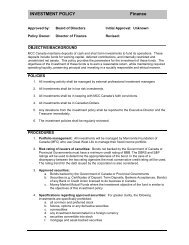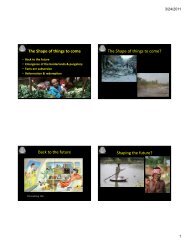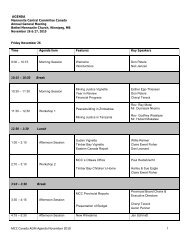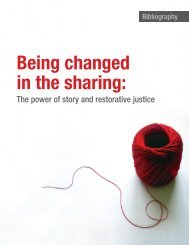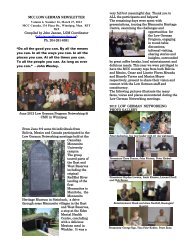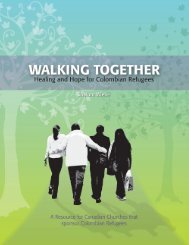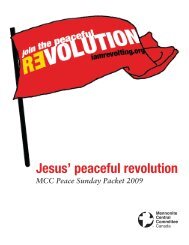to download PDF - Mennonite Central Committee Canada
to download PDF - Mennonite Central Committee Canada
to download PDF - Mennonite Central Committee Canada
You also want an ePaper? Increase the reach of your titles
YUMPU automatically turns print PDFs into web optimized ePapers that Google loves.
Voice 3: And by faith, the people passed through theRed Sea. And by faith…Voice 4: During World War Two, my hero wasReverend E.J. Swalm, who had been imprisoned inthe First World War for his refusal <strong>to</strong> put on thearmy uniform. I remember how at a public meeting,he spoke so sincerely and passionately of his experiencesand his final release from prison. I was ayoung man of 21 at that time, and his words had abig impact on me.Voice 3: By faith we understand that the worlds wereprepared by the word of God, so that what is seenwas made from things that are not visible.Voice 2: So the s<strong>to</strong>ry does go back pretty far. I’m stilltrying <strong>to</strong> understand how this s<strong>to</strong>ry helps us <strong>to</strong>day.Why is it important <strong>to</strong> remember the s<strong>to</strong>ries of COs?Voice 4: Remembering the faith of conscientiousobjec<strong>to</strong>rs in the past provides a legacy that presentand future COs can draw on for support andinstruction when faced with similar decisions of conscience.This Christian heritage of objection <strong>to</strong> warin all forms thus becomes the foundation—thecommon bond of reference for one and all.Voice 2: A legacy for the future? A common bondfor everyone? How can this be?Voice 4: This heritage provides validity and supportby linking past and present Christian objec<strong>to</strong>rs in<strong>to</strong> atradition of resistance, a peoplehood of many whofaithfully refuse <strong>to</strong> participate in war—at anyhazard.Voice 2: A tradition of resistance sounds pretty radical.Voice 1: Roots do go deep in<strong>to</strong> the earth. The pastdoes help the present come in<strong>to</strong> existence.Voice 4: For me, I feel it is important for these veryreasons that the s<strong>to</strong>ries of those who were conscientiousobjec<strong>to</strong>rs in the past be passed on. They are areminder of what it means <strong>to</strong> stand firm in one’sbeliefs, as Jesus and his followers both preached andtaught by example.Voice 3: Therefore, since we are surrounded by sogreat a cloud of witnesses, let us also lay aside everyweight and the sin that clings so closely, and let usrun with perseverance the race that is set before us,looking <strong>to</strong> Jesus the pioneer and perfecter of ourfaith.(pause for about 5 seconds—this is the breakbetween the first and second sections)Voice 2: What about <strong>to</strong>day? We’re not at war <strong>to</strong>day,are we? There’s nothing that requires us <strong>to</strong> be radicalor <strong>to</strong> go against the system like our forbearers did.Voice 1: But being radical doesn’t just mean beingchallenging. It also means going back <strong>to</strong> the roots.The word radical means “of the root”. It meansgoing back <strong>to</strong> the roots of our faith. It means feelingconnected <strong>to</strong> all those who—because they were followingJesus—were witnesses for peace before us.Voice 4: Jesus was unarguably a radical. Jesus didnot do what was expected of him by the people butrather what was required of him by God and God’slaw. In the days of the early Anabaptists, being anAnabaptist required one <strong>to</strong> be a radical—they had <strong>to</strong>be willing <strong>to</strong> sacrifice their lives for their beliefs. Ialso see COs as being radicals.Voice 2: So does God call us <strong>to</strong> be radicals? Whatdoes it mean <strong>to</strong> be a radical witness for peace?Voice 3: By faith, Noah built an ark. By faith,Abraham and Sarah obeyed when they were called.Therefore, since we are surrounded by so great acloud of witnesses, let us run with perseverance therace that is set before us, looking <strong>to</strong> Jesus the pioneerand perfecter of our faith.Voice 1: Being radical means going back <strong>to</strong> the rootsof our faith. It means feeling connected <strong>to</strong> all thosewho - because they were following Jesus—were witnessesfor peace before us.Voice 4: I believe that certain stripes of <strong>Mennonite</strong>sare seen as radicals and that we more modern<strong>Mennonite</strong>s are included, even though we do notconsider ourselves <strong>to</strong> be radical. By the generalpublic, <strong>Mennonite</strong>s are considered <strong>to</strong> be peacemakers.Voice 2: I think that’s right that we don’t considerourselves <strong>to</strong> be radical. When I look at my own life,I think about how normal it is. I think about howmy life is nowhere near as dramatic and exciting assome of these people who were COs.Voice 4: Being a radical peace witness is nothingmore than living a life of peace, demonstrating <strong>to</strong>lerance,and supporting good works. It means livingout our essential beliefs as they apply <strong>to</strong> thechurches’ work through MCC and MEDA, throughpeace and justice initiatives, and through res<strong>to</strong>ring,recycling, and caring for our environment.39



